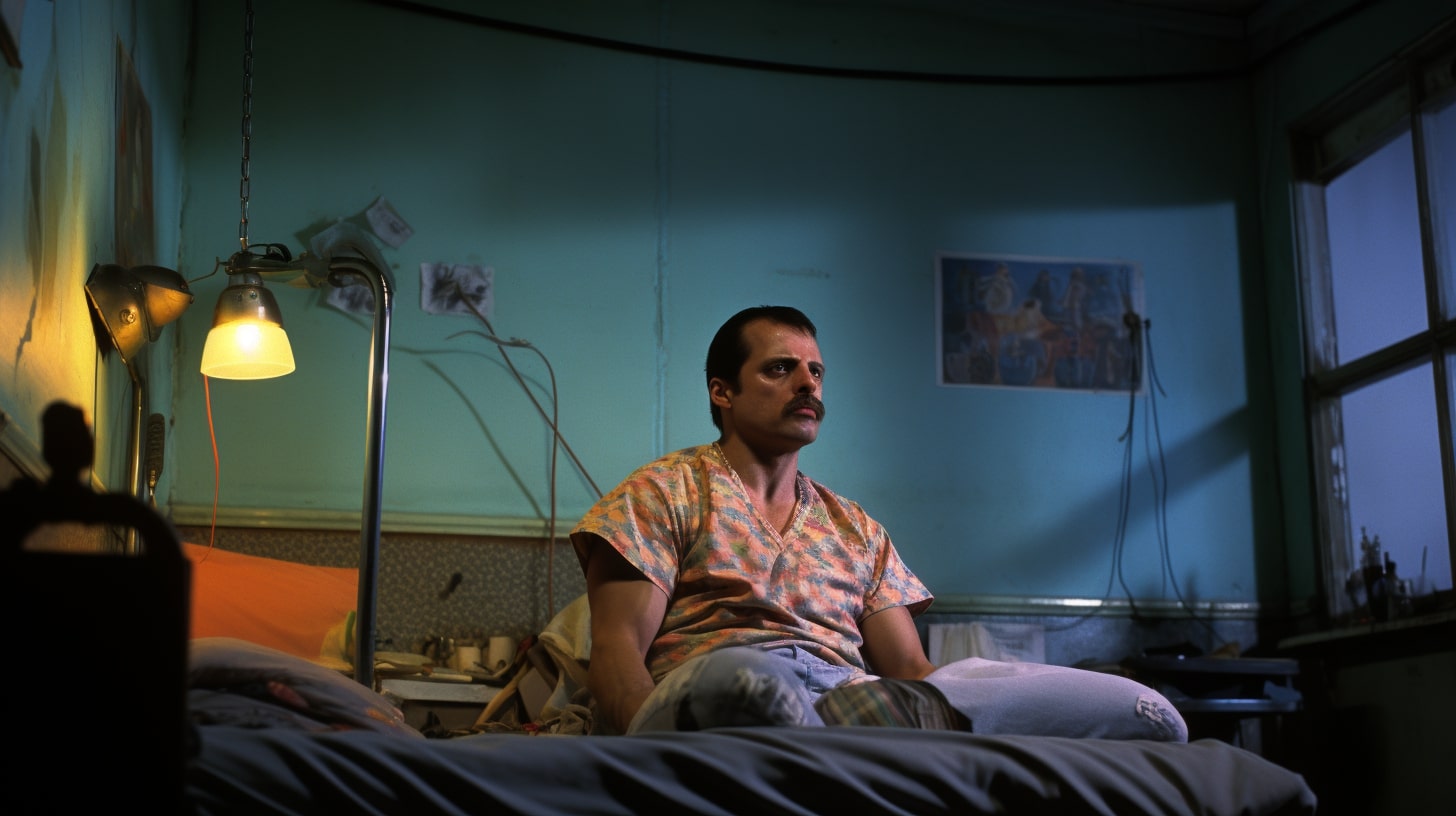Freddie Mercury, the iconic frontman of the British rock band Queen, captivated audiences with his powerful vocals and flamboyant stage presence.
Understanding the context of Mercury’s death is essential to appreciating his enduring legacy as a musician, singer, and cultural icon. Despite his personal struggles, Mercury’s unwavering commitment to his craft left an indelible mark on the music industry and inspired countless fans worldwide.
Contents
Freddie Mercury’s Life and Career
Early Life and the Hectics
Freddie Mercury, born Farrokh Bulsara on September 5, 1946, in Stone Town, Zanzibar (now in Tanzania), grew up in a Parsi family that had emigrated to Africa. In his early days, he was sent to a boarding school in India, where he formed his first band, the Hectics. He moved back to Zanzibar, but the Zanzibar Revolution forced his family to flee to England in the mid-1960s.
Queen’s Formation and Success
Mercury attended art school in London and befriended Mary Austin, who would become his lifelong companion. Mercury, influenced by the rock and pop culture of the time, joined a series of bands before meeting guitarist Brian May and drummer Roger Taylor. In 1970, the trio formed Queen, with bassist John Deacon joining the band in 1971. Queen’s blend of hard rock, glam, and experimental pop quickly earned them a following, and their eponymous debut album was released in 1973.
With Mercury’s powerful, agile vocals and flamboyant stage presence, Queen charted an ambitious path through the 1970s and 1980s as one of rock’s most dynamic and beloved bands. Their hits, including We Will Rock You, We Are the Champions, and Don’t Stop Me Now, became anthems for generations of fans.
Bohemian Rhapsody and Other Hits
Possibly their most famous song, Bohemian Rhapsody, was released in 1975 on the album A Night at the Opera. The six-minute epic, largely written and composed by Mercury, defied conventional song structures and featured iconic operatic sections alongside hard rock segments.
Over the years, Queen released numerous classic hits such as Somebody to Love, Radio Ga Ga, and Under Pressure (a collaboration with David Bowie). Mercury’s charismatic showmanship and the band’s unique sound continued to captivate audiences. Their final live performance with Mercury took place at Knebworth Park in 1986 in front of a crowd of 120,000 people.
The Private World of Freddie Mercury
Relationships and Orientation
Freddie Mercury was known for being a private person when it came to his relationships and sexual orientation. He had several long-term relationships throughout his life, most notably with Mary Austin, whom he often referred to as his “common-law” wife. He was the inspiration behind the hit song “Crazy Little Thing Called Love.”
Although their romantic relationship ended in the late 1970s, Mercury and Austin remained close friends, and he even left her a large portion of his estate. Mercury went on to have relationships with men, including David Minns and his long-term partner Jim Hutton, who was by his side throughout Mercury’s final days.
Lifestyle and Friends
The private world of Freddie Mercury extended to his lifestyle and group of close friends. Despite his iconic and flamboyant stage presence, Mercury led a relatively quiet life, spending much of his time with his cats, his close friends like Mary Austin, and his family. Mercury created a tight-knit inner circle of friends who were given nicknames and were fiercely loyal to the legendary singer.
Artistic Interests
Freddie Mercury’s artistic interests were an essential aspect of his life, influencing both his music and his private world. Trained as a graphic designer, Mercury had a keen eye for visual flair and was heavily involved in creating album artwork, stage outfits, and set designs for Queen’s live performances. His passion for art and aesthetics was an integral part of his identity, allowing him to connect with his audience in a way that few performers can.
To summarize, the private world of Freddie Mercury was characterized by his close relationships, quiet lifestyle, and deep artistic interests. Although he rarely opened up about his personal life, the legacy of his music and humanitarian work continues to inspire millions of people worldwide today.
Health Decline and HIV/AIDS Diagnosis
Deteriorating Health
Freddie Mercury, the iconic lead singer of the band Queen, began exhibiting symptoms of HIV/AIDS as early as 1982. Mercury secretly visited a doctor in New York City to get a white lesion on his tongue checked, which might have been hairy leukoplakia, one of the first signs of the disease. Despite constant scrutiny, Mercury kept his health concerns a secret, especially when rumors circulated that he had been tested for HIV/AIDS in 1986.
The news of his deteriorating health led Queen to abruptly end the 1987 Magic Tour, one of the band’s largest tours seen by over a million people. Mercury’s body was significantly affected by AIDS, and he struggled with the disease for years, having initially been diagnosed several years before his death.
Medical Treatment and Harley Street Clinic
Mercury sought professional medical help for his condition, which became publicly known the day before his death. On November 24, 1991, Freddie Mercury tragically lost his battle with AIDS. Many people close to Mercury, including his personal physician Dr. Diana Moseley, witnessed his unwavering bravery in the face of such a devastating diagnosis.
Freddie Mercury’s struggle with HIV/AIDS ultimately brought more attention to the disease and spurred advocacy for increased research and funding. While “Bohemian Rhapsody,” the biographical film about Mercury’s life and Queen’s rise to fame, received some criticism for its portrayal of Mercury’s diagnosis, it also brought renewed interest in the late singer’s life and the tragic end that befell him due to the disease.
Freddie Mercury’s Legacy and Final Days
These Are the Days of Our Lives Music Video
As the lead singer of Queen, Freddie Mercury had an exceptional career marked by his powerful voice, flamboyant stage presence, and iconic performances, such as the Live Aid concert at Wembley Stadium. One of his last poignant creations was the music video for “These Are the Days of Our Lives.” The video was filmed in May 1991, just months before Mercury’s passing on November 24, 1991. In the video, Mercury’s frail appearance was evident, but his passion for music remained undiminished.
By this time, Mercury was living a very private life in his Kensington home, Garden Lodge. In his final days, he spent time admiring his artwork and cherished possessions and was surrounded by his closest friends and loved ones. It is reported that his ashes were scattered in Montreux, Switzerland, a place he held dear to his heart.
Freddie Mercury: The Final Act Documentary
The “Freddie Mercury: The Final Act” documentary delves into the last months of Freddie Mercury’s life, showcasing his determination to create music until the very end. The documentary reveals his strong bond with his Queen bandmates, Brian May and Roger Taylor, as they supported him during his battle with HIV/AIDS.
During his illness, Mercury continued to work on Queen’s album “Made in Heaven.” His solo career also flourished despite his struggles, further cementing his place as a true rock legend. In this documentary, fans gain an insight into his unwavering commitment to music, even as he faced his own mortality.
Mercury’s legacy continues to live on, with Queen’s music enjoyed by generations. In 2001, Queen was inducted into the Rock and Roll Hall of Fame, and, more recently, Rami Malek portrayed Mercury in the biographical film “Bohemian Rhapsody,” which received critical acclaim. The story of Mercury’s final days and his remarkable talent has touched the hearts of millions, ensuring that his contributions to the world of music will never be forgotten.
Impact on AIDS Awareness and Popular Culture
Freddie Mercury: Legal Battles, Wills, and Estates
Freddie Mercury, the legendary lead singer of the rock band Queen, died on November 24, 1991, due to AIDS-related complications, specifically bronchial pneumonia. Before his death, Mercury had to navigate various legal battles, wills, and estate issues. In his will, he left the majority of his wealth, including his lavish West London home, to his long-time friend and former common-law wife, Mary Austin.
Additionally, Mercury left a substantial amount of money to his partner, Jim Hutton, and to his band members, Brian May, Roger Taylor, and John Deacon.
The guitarist’s estate had to deal with posthumous earnings, such as recording royalties generated from Mercury’s music, which continued to generate income long after his death. The band Queen maintained ownership of Mountain Studios in Switzerland, where they recorded much of their iconic music, and Mercury’s estate continues to benefit from the band’s enduring popularity.
Stigma Reduction and AIDS Awareness
Freddie Mercury is considered one of the most influential figures in popular culture who played a significant role in reducing the stigma surrounding HIV/AIDS. When he passed away in 1991, the public’s knowledge of the virus was limited, and the disease carried a strong stigma. Mercury’s high-profile death was a turning point in the perception of HIV/AIDS, as it brought the epidemic into the public’s consciousness.
The music icon’s struggle with the disease and eventual death helped create a dialogue about HIV/AIDS and promoted a better understanding of the virus. This led to an increased effort to raise public awareness and funding for HIV/AIDS research and treatment.
As a result, many celebrities, such as Roger Taylor, took up the fight against AIDS in Mercury’s memory, participating in charity events and concerts to generate funds and support for those living with the virus.
Following Freddie Mercury’s death, the remaining members of Queen organized the Freddie Mercury Tribute Concert for AIDS Awareness, which was held on April 20, 1992, at London’s Wembley Stadium. The concert featured some of the biggest names in the music industry and served as an opportunity for the world to pay tribute to Mercury while raising much-needed awareness about HIV/AIDS.
In addition to the concert, Mercury’s life and death have been commemorated in several other ways, such as the high-profile 2018 biographical film, “Bohemian Rhapsody,” which garnered widespread attention and reignited discussions about HIV/AIDS. Mercury’s persistent influence on popular culture and his contributions to raising AIDS awareness continue to reverberate throughout the world today.


